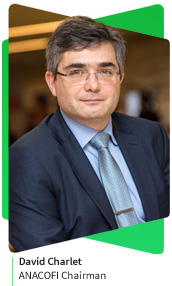|
 David Charlet, David Charlet,
ANACOFI Chairman
Financial education (literacy) of investors and training of advisors and intermediaries:
is the Retail Investment Strategy a revolution and where is it taking us?
The European education reform will soon be 35 years old and for almost 10 years, texts have imposed precise specific annual training requirements on certain professionals in our jobs.
The debate sometimes focused on the question of content, other times on the volume and of course, the questions of proof of monitoring or acquisition of skills very quickly occupied minds.
Certification or diploma and what information should appear on a monitoring certificate, are all questions which, in each Member State, had to be answered.
Although the monitoring methods were rapidly the subject of a shared analysis, the volumes and programs were more difficult to harmonize.
At the same time, with the complexity of offers and legal rules, scams or the mass dissemination of information, another necessity has emerged: the need to improve the level of understanding of consumers and savers. For them, as for professionals, the content, format and proof of acquired skills quickly became topics of debate and even regulations sometimes included within national plans.
In this context, the “Retail Investment Strategy” (RIS) now for the first time addresses both the training of professionals and the financial education of populations.
If (with regard to consumers and savers), we can regret the lack of ambition of the RIS, which simply decrees that States must make their best efforts, on the side of professionals, it decides and becomes of paramount interest, considering it is only a level 1 text, which will be supplemented by others, probably more precise.
It is not neutral that this omnibus text leads to IDD and MIFid each requiring 15 hours of annual training for approved professionals and certification in ESG (sustainability) matters.
This is all the less so since a revision of the Credit Directives will most likely follow, which also would address the constraints of professionals acting in these areas.
While the European Union affirmed the supremacy of diplomas 35 years ago, here it is highlighting certification.
While it asked Member States to demonstrate that their annual training system for their agreed professionals was adequate, it sets a framework based on volume and clearly refers to regulators and no longer to the authorities dedicated to education and training in general, the responsibility for defining content and modalities over time.
Even if in many states it was already a fact that regulators had taken control, today it is an element that will be engraved in hard law at the highest level.
Therefore, associating professionals to the decisions of regulators becomes an imperative necessity.
Failing this, not only will the normal functioning of a State, which takes into account its civil society, no longer be the rule in terms of training and education which will be mechanically impacted, but decisions might no longer be dictated by need and indeed more by the security constraint. The politician who wants adequacy but also investment and innovation, shall have to comply with what is perfectly normal for a police officer or regulator: avoiding accidents and tracking down dangerous behavior as defined in the elements of conformity, which moreover he is now helping to draft.
We are clearly seeing a shift in power towards the gendarme who is also very often a judge. The importance of the full, complete and assured place in its bodies, of the publics it supervises is therefore no longer to be seen as something to be avoided because it is fraught with conflicts of interest. It becomes an absolute necessity, helping to take into account the opinions of those on whom they will impose training and certifications.
In France, the so-called “co-regulation” system, if correctly applied, in compliance with the spirit of the law, can probably be adapted without a legal revolution.
But what about elsewhere?
In any case, those of our professionals who complained about the annual volume of their training obligations must now understand that the debate is closed. They will have to follow more training, these will be formatted, often certifying therefore with formal tests and the more certifications they display, the more these compulsory hours will add up.
Until the populations of the Union have reached a sufficient level of financial competence, this is the price at which we will be able to work. This is seen by our authorities and by many of us as a guarantee for the consumer, saver or investor who is our client.
|